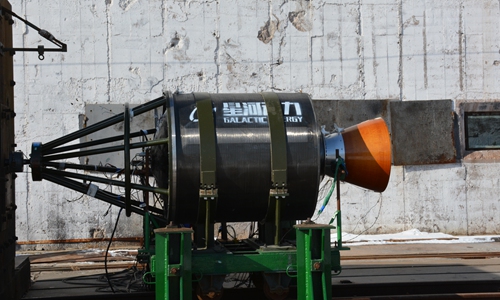HOME >> SOURCE
Private Chinese company Galactic Energy completes stage-3 firing tests for rocket
Source:Global Times Published: 2019/12/5 18:33:40

Galactic Energy's Ceres-1 launch vehicle during the ground firing test for its third-stage engine Photo: Courtersty of Galactic Energy
Private Chinese low-cost rocket company Galactic Energy Aerospace Technology Co has completed the ground firing test for the third-stage engine of its Ceres-1 launch vehicle, a move which makes it the third private company to do so in China.The firing test for a third-stage engine is the most demanding of all engine tests, Xing Qiang, an expert from the Small Rocket Studio, told the Global Times on Thursday. This is the first company that has had the capacity to complete the test, after Beijing-based LandSpace and iSpace.
It is the last firing test for the rocket's engines, and the rocket will be ready for launch in March 2020 after a final systematic test, according to Wu Yue, a representative from Galactic Energy.
The Ceres-1 rocket is a low Earth orbit (LEO) solid rocket and is one of two rockets that the company is currently developing. It is designed to provide quick launch services (within 24 hours) for LEO small satellites. The company's liquid rocket, Pallas-1, will be launched in December 2022.
"The rockets are targeted at serving smaller companies," Wu told the Global Times on Thursday. "The launch vehicles, including the Ceres-1 and the Pallas-1, are used to launch small satellites ranging from 50 kilograms to 350 kilograms. Some clients, including schools, have already reached out for our products and services."
The Ceres-1 is a four-stage rocket. Solid engines are used in the first, second and third stages, and the fourth stage uses an advanced liquid engine. The third-stage engine is designed to have a thrust of 8.8 tons and a burning time of 69 seconds.
Prior to the third-phase test, ground firing tests for the Ceres-1's first and second-stage engines had already been completed in September and early November, Wu said.
"As a budget rocket company, its rocket launch vehicles have huge potential for wider business applications," Xing said.
Posted in: COMPANIES